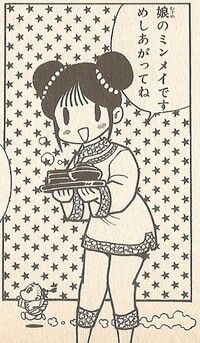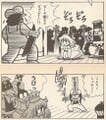Minmei
| Minmei | |
|---|---|

| |
| Species | Human |
| First appearance | Super Mario (Super Mario Land) (1989) |
- “
娘 のミンメイです
めしあがってね
(I'm his daughter Minmei. Please, eat.)” - —Minmei, Super Mario Land
Minmei[1] is an original character that appears in the Super Mario Land manga adaptation in the Super Mario series from KC Deluxe. She is a maiden of Chai Kingdom's temple and the daughter of Dousi, the daoshi that runs the place. She is a young woman wearing a long sleeved cheongsam and her hair tied in an odango hairstyle. She is one of the few characters in the manga series to not have any visible sclera.
Mario and Mecha Kuribō are sheltered in the temple by Nankin and are taken to Dousi to formulate a plan. Minmei appears and offers Mario food, but not to Mecha Kuribō since robots do not need to eat (unaware that the robot is actually Princess Peach in disguise), forcing it to have Mario's leftover. Minmei and Nankin then inform Mario that, by leaving the temple, he will be swarmed by Pionpi. A magic seal prevents them from entering, so Mecha Kuribō decides to create another one that Mario can use to reach the Sky Pop at the airport. While doing so, Mecha Kuribō takes some rice prepared from Minmei.
Later, a Goombo knocks at the temple's door, asking for shelter from the Pionpi. Nankin removes the seal, which was used as a door latch, and welcomes the Goombo in, but it takes the seal and destroys it, letting the Pionpi inside. Minmei and Nankin are the first ones to succumb to the Pionpi's bite, turning themselves into Pionpi as well and managing to infect the Dōshi.
After Mario defeats Tatanga, the Pionpi curse is lifted and Minmei and the others return to normal.
Gallery[edit]
Names in other languages[edit]
| Language | Name | Meaning | Notes |
|---|---|---|---|
| Japanese | ミンメイ[2] Minmei |
Transliteration of the Chinese name「明美」(Míngměi), meaning "smart and beautiful" |


